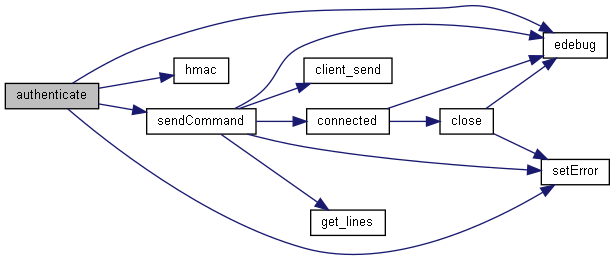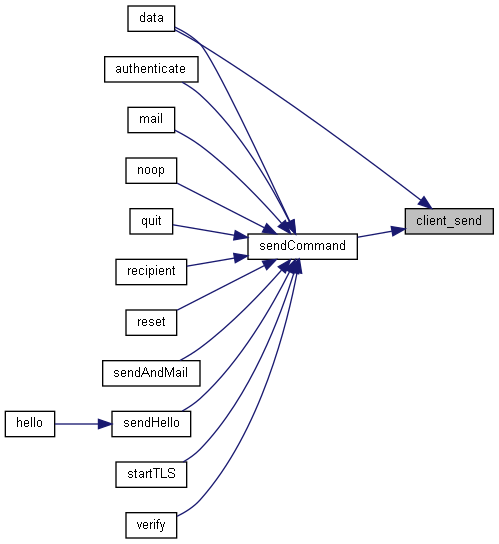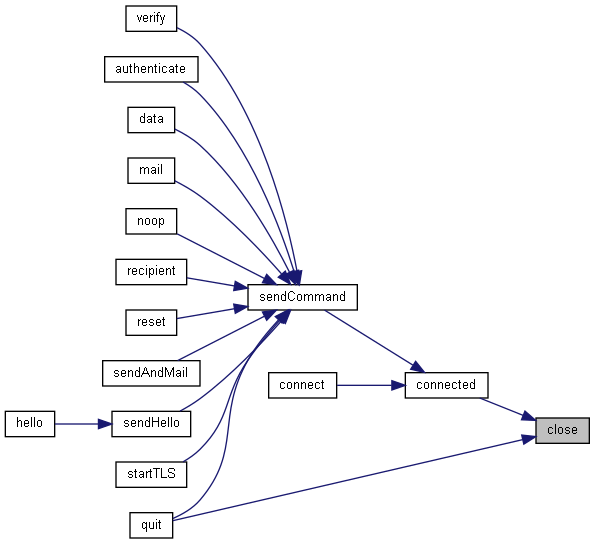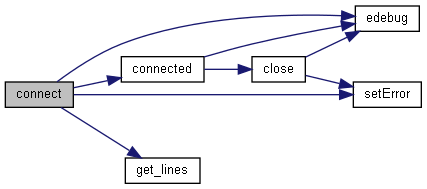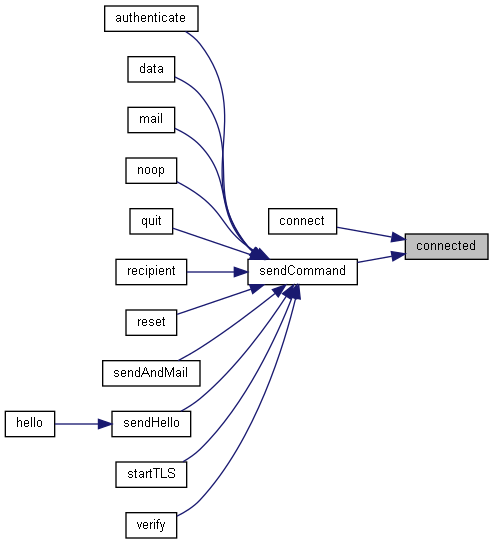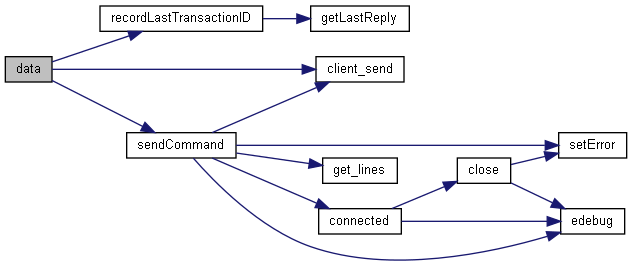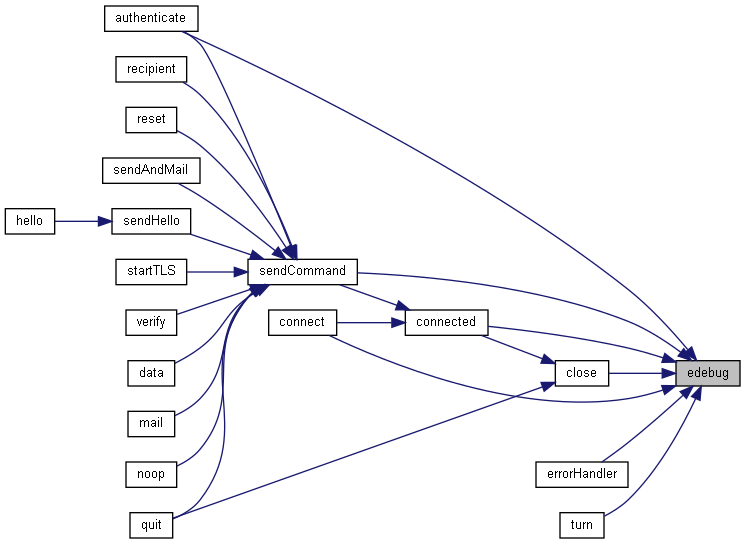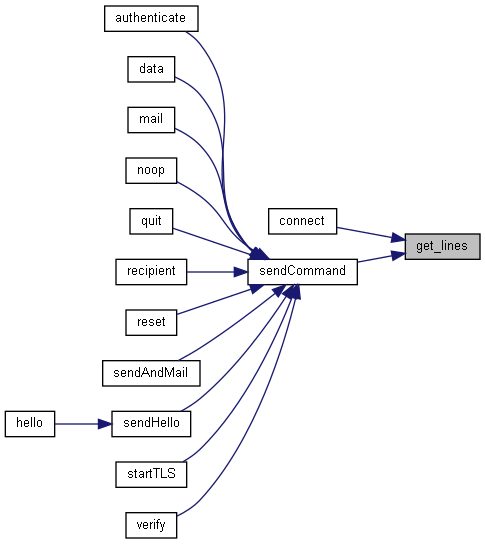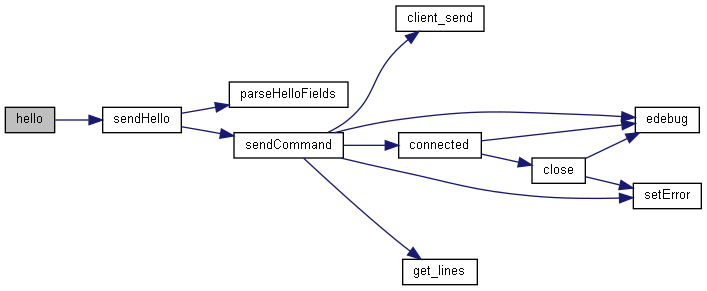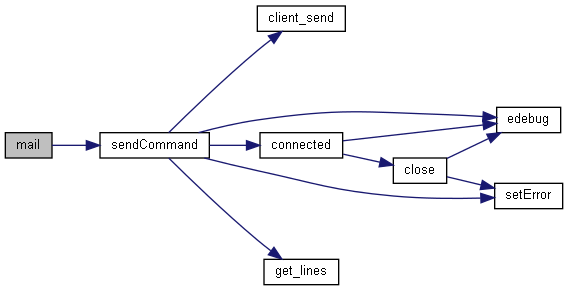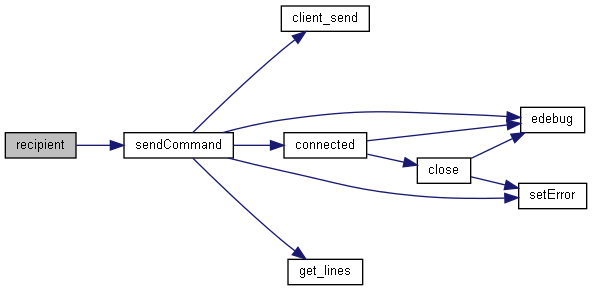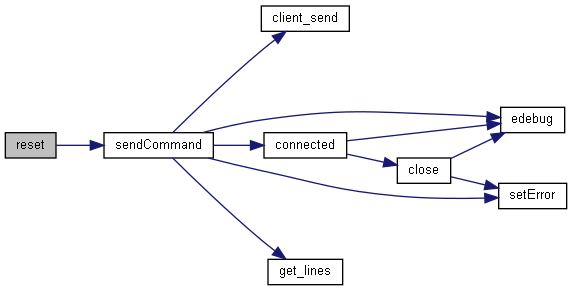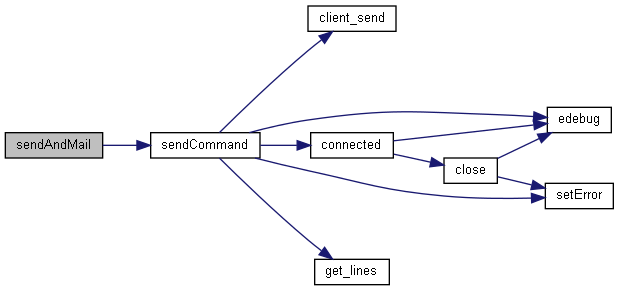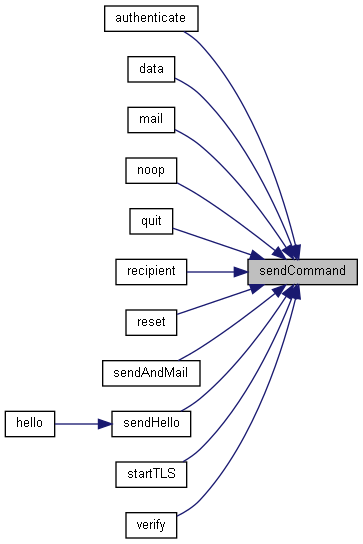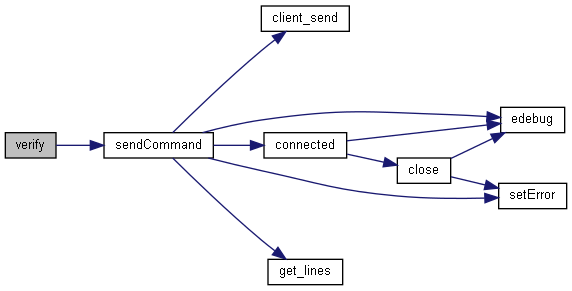|
| | edebug ($str, $level=0) |
| |
| | hmac ($data, $key) |
| |
| | sendHello ($hello, $host) |
| |
| | parseHelloFields ($type) |
| |
| | sendCommand ($command, $commandstring, $expect) |
| |
| | get_lines () |
| |
| | setError ($message, $detail='', $smtp_code='', $smtp_code_ex='') |
| |
| | errorHandler ($errno, $errmsg, $errfile='', $errline=0) |
| |
| | recordLastTransactionID () |
| |
◆ authenticate()
| authenticate |
( |
|
$username, |
|
|
|
$password, |
|
|
|
$authtype = null, |
|
|
|
$realm = '', |
|
|
|
$workstation = '', |
|
|
|
$OAuth = null |
|
) |
| |
Perform SMTP authentication. Must be run after hello().
- See also
- hello()
- Parameters
-
| string | $username | The user name |
| string | $password | The password |
| string | $authtype | The auth type (PLAIN, LOGIN, NTLM, CRAM-MD5, XOAUTH2) |
| string | $realm | The auth realm for NTLM |
| string | $workstation | The auth workstation for NTLM |
| null | OAuth | $OAuth | An optional OAuth instance ( |
- See also
- PHPMailerOAuth)
- Returns
- bool True if successfully authenticated.* @access public
◆ client_send()
Send raw data to the server.
- Parameters
-
| string | $data | The data to send @access public |
- Returns
- integer|boolean The number of bytes sent to the server or false on error
◆ close()
Close the socket and clean up the state of the class. Don't use this function without first trying to use QUIT.
- See also
- quit() @access public
- Returns
- void
◆ connect()
| connect |
( |
|
$host, |
|
|
|
$port = null, |
|
|
|
$timeout = 30, |
|
|
|
$options = array() |
|
) |
| |
Connect to an SMTP server.
- Parameters
-
| string | $host | SMTP server IP or host name |
| integer | $port | The port number to connect to |
| integer | $timeout | How long to wait for the connection to open |
| array | $options | An array of options for stream_context_create() @access public |
- Returns
- boolean
◆ connected()
Check connection state. @access public
- Returns
- boolean True if connected.
◆ data()
Send an SMTP DATA command. Issues a data command and sends the msg_data to the server, finializing the mail transaction. $msg_data is the message that is to be send with the headers. Each header needs to be on a single line followed by a <CRLF> with the message headers and the message body being separated by and additional <CRLF>. Implements rfc 821: DATA <CRLF>
- Parameters
-
| string | $msg_data | Message data to send @access public |
- Returns
- boolean
◆ edebug()
| edebug |
( |
|
$str, |
|
|
|
$level = 0 |
|
) |
| |
|
protected |
Output debugging info via a user-selected method.
- See also
- SMTP::$Debugoutput
-
SMTP::$do_debug
- Parameters
-
| string | $str | Debug string to output |
| integer | $level | The debug level of this message; see DEBUG_* constants |
- Returns
- void
◆ errorHandler()
| errorHandler |
( |
|
$errno, |
|
|
|
$errmsg, |
|
|
|
$errfile = '', |
|
|
|
$errline = 0 |
|
) |
| |
|
protected |
Reports an error number and string.
- Parameters
-
| integer | $errno | The error number returned by PHP. |
| string | $errmsg | The error message returned by PHP. |
| string | $errfile | The file the error occurred in |
| integer | $errline | The line number the error occurred on |
◆ get_lines()
Read the SMTP server's response. Either before eof or socket timeout occurs on the operation. With SMTP we can tell if we have more lines to read if the 4th character is '-' symbol. If it is a space then we don't need to read anything else. @access protected
- Returns
- string
◆ getDebugLevel()
Get debug output level.
- Returns
- integer
◆ getDebugOutput()
Get debug output method.
- Returns
- string
◆ getError()
Get the latest error. @access public
- Returns
- array
◆ getLastReply()
Get the last reply from the server. @access public
- Returns
- string
◆ getLastTransactionID()
Get the queue/transaction ID of the last SMTP transaction If no reply has been received yet, it will return null. If no pattern was matched, it will return false.
- Returns
- bool|null|string
- See also
- recordLastTransactionID()
◆ getServerExt()
A multipurpose method The method works in three ways, dependent on argument value and current state
- HELO/EHLO was not sent - returns null and set up $this->error
- HELO was sent $name = 'HELO': returns server name $name = 'EHLO': returns boolean false $name = any string: returns null and set up $this->error
- EHLO was sent $name = 'HELO'|'EHLO': returns server name $name = any string: if extension $name exists, returns boolean True or its options. Otherwise returns boolean False In other words, one can use this method to detect 3 conditions:
null returned: handshake was not or we don't know about ext (refer to $this->error)
- false returned: the requested feature exactly not exists
- positive value returned: the requested feature exists
- Parameters
-
| string | $name | Name of SMTP extension or 'HELO'|'EHLO' |
- Returns
- mixed
◆ getServerExtList()
Get SMTP extensions available on the server @access public
- Returns
- array|null
◆ getTimeout()
Get SMTP timeout.
- Returns
- integer
◆ getVerp()
Get VERP address generation mode.
- Returns
- boolean
◆ hello()
Send an SMTP HELO or EHLO command. Used to identify the sending server to the receiving server. This makes sure that client and server are in a known state. Implements RFC 821: HELO <SP> <domain> <CRLF> and RFC 2821 EHLO.
- Parameters
-
| string | $host | The host name or IP to connect to @access public |
- Returns
- boolean
◆ hmac()
Calculate an MD5 HMAC hash. Works like hash_hmac('md5', $data, $key) in case that function is not available
- Parameters
-
| string | $data | The data to hash |
| string | $key | The key to hash with @access protected |
- Returns
- string
◆ mail()
Send an SMTP MAIL command. Starts a mail transaction from the email address specified in $from. Returns true if successful or false otherwise. If True the mail transaction is started and then one or more recipient commands may be called followed by a data command. Implements rfc 821: MAIL <SP> FROM:<reverse-path> <CRLF>
- Parameters
-
| string | $from | Source address of this message @access public |
- Returns
- boolean
◆ noop()
Send an SMTP NOOP command. Used to keep keep-alives alive, doesn't actually do anything @access public
- Returns
- boolean
◆ parseHelloFields()
| parseHelloFields |
( |
|
$type | ) |
|
|
protected |
Parse a reply to HELO/EHLO command to discover server extensions. In case of HELO, the only parameter that can be discovered is a server name. @access protected
- Parameters
-
| string | $type | - 'HELO' or 'EHLO' |
◆ quit()
| quit |
( |
|
$close_on_error = true | ) |
|
Send an SMTP QUIT command. Closes the socket if there is no error or the $close_on_error argument is true. Implements from rfc 821: QUIT <CRLF>
- Parameters
-
| boolean | $close_on_error | Should the connection close if an error occurs? @access public |
- Returns
- boolean
◆ recipient()
Send an SMTP RCPT command. Sets the TO argument to $toaddr. Returns true if the recipient was accepted false if it was rejected. Implements from rfc 821: RCPT <SP> TO:<forward-path> <CRLF>
- Parameters
-
| string | $address | The address the message is being sent to @access public |
- Returns
- boolean
◆ recordLastTransactionID()
| recordLastTransactionID |
( |
| ) |
|
|
protected |
Extract and return the ID of the last SMTP transaction based on a list of patterns provided in SMTP::$smtp_transaction_id_patterns. Relies on the host providing the ID in response to a DATA command. If no reply has been received yet, it will return null. If no pattern was matched, it will return false.
- Returns
- bool|null|string
◆ reset()
Send an SMTP RSET command. Abort any transaction that is currently in progress. Implements rfc 821: RSET <CRLF> @access public
- Returns
- boolean True on success.
◆ sendAndMail()
Send an SMTP SAML command. Starts a mail transaction from the email address specified in $from. Returns true if successful or false otherwise. If True the mail transaction is started and then one or more recipient commands may be called followed by a data command. This command will send the message to the users terminal if they are logged in and send them an email. Implements rfc 821: SAML <SP> FROM:<reverse-path> <CRLF>
- Parameters
-
| string | $from | The address the message is from @access public |
- Returns
- boolean
◆ sendCommand()
| sendCommand |
( |
|
$command, |
|
|
|
$commandstring, |
|
|
|
$expect |
|
) |
| |
|
protected |
Send a command to an SMTP server and check its return code.
- Parameters
-
| string | $command | The command name - not sent to the server |
| string | $commandstring | The actual command to send |
| integer | array | $expect | One or more expected integer success codes @access protected |
- Returns
- boolean True on success.
◆ sendHello()
| sendHello |
( |
|
$hello, |
|
|
|
$host |
|
) |
| |
|
protected |
Send an SMTP HELO or EHLO command. Low-level implementation used by hello()
- See also
- hello()
- Parameters
-
| string | $hello | The HELO string |
| string | $host | The hostname to say we are @access protected |
- Returns
- boolean
◆ setDebugLevel()
| setDebugLevel |
( |
|
$level = 0 | ) |
|
Set debug output level.
- Parameters
-
◆ setDebugOutput()
| setDebugOutput |
( |
|
$method = 'echo' | ) |
|
Set debug output method.
- Parameters
-
| string | callable | $method | The name of the mechanism to use for debugging output, or a callable to handle it. |
◆ setError()
| setError |
( |
|
$message, |
|
|
|
$detail = '', |
|
|
|
$smtp_code = '', |
|
|
|
$smtp_code_ex = '' |
|
) |
| |
|
protected |
Set error messages and codes.
- Parameters
-
| string | $message | The error message |
| string | $detail | Further detail on the error |
| string | $smtp_code | An associated SMTP error code |
| string | $smtp_code_ex | Extended SMTP code |
◆ setTimeout()
| setTimeout |
( |
|
$timeout = 0 | ) |
|
Set SMTP timeout.
- Parameters
-
◆ setVerp()
| setVerp |
( |
|
$enabled = false | ) |
|
Enable or disable VERP address generation.
- Parameters
-
◆ startTLS()
Initiate a TLS (encrypted) session. @access public
- Returns
- boolean
◆ turn()
Send an SMTP TURN command. This is an optional command for SMTP that this class does not support. This method is here to make the RFC821 Definition complete for this class and may be implemented in future Implements from rfc 821: TURN <CRLF> @access public
- Returns
- boolean
◆ verify()
Send an SMTP VRFY command.
- Parameters
-
| string | $name | The name to verify @access public |
- Returns
- boolean
◆ $CRLF
◆ $Debugoutput
◆ $do_debug
| $do_debug = self::DEBUG_OFF |
◆ $do_verp
◆ $error
Initial value:= array(
'error' => '',
'detail' => '',
'smtp_code' => '',
'smtp_code_ex' => ''
)
◆ $helo_rply
◆ $last_reply
◆ $last_smtp_transaction_id
| $last_smtp_transaction_id |
|
protected |
◆ $server_caps
◆ $smtp_conn
◆ $SMTP_PORT
◆ $smtp_transaction_id_patterns
| $smtp_transaction_id_patterns |
|
protected |
Initial value:= array(
'exim' => '/[0-9]{3} OK id=(.*)/',
'sendmail' => '/[0-9]{3} 2.0.0 (.*) Message/',
'postfix' => '/[0-9]{3} 2.0.0 Ok: queued as (.*)/'
)
◆ $Timelimit
◆ $Timeout
◆ $Version
◆ CRLF
◆ DEBUG_CLIENT
Debug level to show client -> server messages
◆ DEBUG_CONNECTION
| const DEBUG_CONNECTION = 3 |
Debug level to show connection status, client -> server and server -> client messages
◆ DEBUG_LOWLEVEL
Debug level to show all messages
◆ DEBUG_OFF
Debug level for no output
◆ DEBUG_SERVER
Debug level to show client -> server and server -> client messages
◆ DEFAULT_SMTP_PORT
| const DEFAULT_SMTP_PORT = 25 |
◆ MAX_LINE_LENGTH
| const MAX_LINE_LENGTH = 998 |
◆ VERSION
The documentation for this class was generated from the following file:


